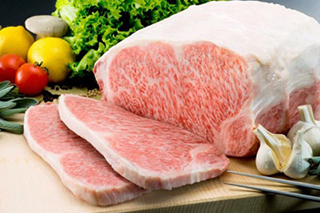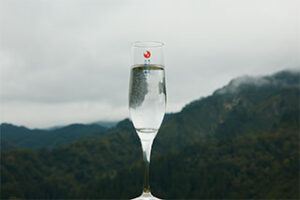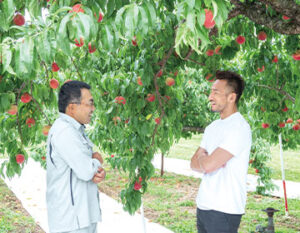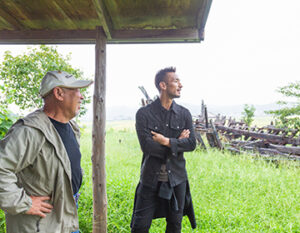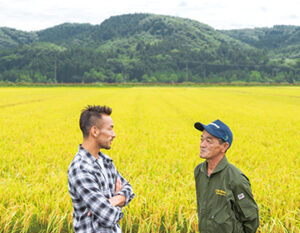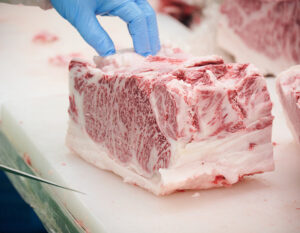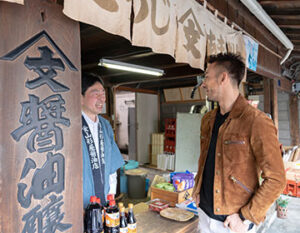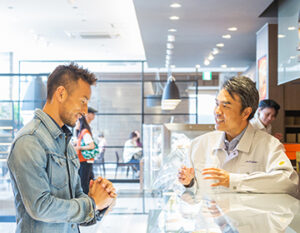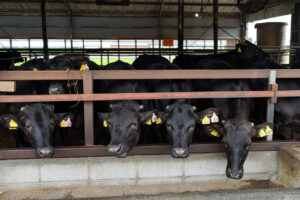Adatara-yama’s Great Nature Nurtures High-Quality Fukushima Beef
In recent years, Fukushima beef has gained a reputation for its high quality. In Otama Village at the foot of Mt. Adatara, there is a man known as the driving force behind this trend. Otama Village, at the foot of Mt. Hironao Suzuki, who has won numerous awards at cattle fairs and is known as one of the leading producers in the prefecture, says, “Water, air, and high-quality rice straw are the conditions for raising delicious cows.
Mt. Adatara, which was described as “the real sky” in Kotaro Takamura’s “Chieko Sho” (Chieko’s Book of Poems). The gently sloping ridgeline landed at the end of the mountain, where a countryside spread out. Hironao Suzuki and his wife run a livestock business in a corner of the rice paddies. Hidetoshi Nakata was invited into the guest room of Mr. Suzuki’s house, looked at the bundles of ears of rice on the wall, and asked, “What is so special about these rice straws? Does this straw have any special meaning?” It is 50 years’ worth of rice ears that Mr. Suzuki has harvested since he started farming at the age of 20. It was about the same time I started raising cattle, so it’s been half a century.”
There are two types of beef cattle farmers: breeding farmers, who raise calves until they are about 9 to 10 months old, and fattening farmers, who raise them for about 20 months. Mr. Suzuki is a fattening farmer of the latter type and is known as a representative producer in Fukushima Prefecture. 2017, he won the Minister of Agriculture, Forestry, and Fisheries Award at the Beef Cattle Carcass Kyoreikai organized by the National Beef Cattle Promotion Fund Association. In the same year, he also won the highest honorary award at the 19th Zenno-Nohshi Eda Nikkyo Reikai, as well as numerous other awards.
The aroma is good, and the fat is not too greasy, which is a characteristic of Fukushima beef,” said Mr. Suzuki, who is modest about his own achievements.
Although Mr. Suzuki is modest about his own achievements, he is proud to say that the quality of the beef he has raised with great care is something he can boast of to the world.


Taking on the Challenge of Spreading Wagyu Beef Overseas
It is often said that bloodlines determine the breed of cattle,” Mr. Suzuki replied immediately to Mr. Nakata’s question, “but how do you bring about the unique characteristics common to the Fukushima region?
Originally, each farmer devised his own feed, but because of this, there was a large variation in meat quality. Then, after listening to everyone’s opinions, we standardized the feed. As a result, we were able to improve the quality of the entire region.”
He continues, “Rice straw is one of the most important ingredients in the feed. If you compare it to a human meal, rice straw is the rice, and formula feed is the side dish. No matter how sumptuous the side dish is, it is important to eat a good staple food. The hardness of rice straw varies depending on the variety, but I believe that Koshihikari is the most suitable for cattle ruminating.
While the reputation of Fukushima beef has been growing in recent years, the price of moto-ushi, which could be purchased for 500,000 yen before the earthquake, has skyrocketed to nearly double that. Mr. Suzuki’s sense of crisis was heightened by the fact that farmers are closing their businesses one after another due to the aging of the population. However, when asked how he is responding to the trend toward trade liberalization, with the Trans-Pacific Partnership Agreement (TPP) coming into effect at the end of last year and the Japan-Europe EPA (Economic Partnership Agreement) in February, he looks forward, saying that as a producer he has no choice but to continue producing good cattle.
He replied, “If cheap beef from other countries enters the market, the competition will become even tougher. But I am sure that there will be consumers who will choose good quality and delicious meat.
Nodding his head in agreement, Mr. Nakata encourages producers to see trade liberalization not only as a challenge but also as an opportunity.
When I go abroad, I am asked about Wagyu beef by many people. That’s how interested they are in Japanese beef. This is an opportunity to expand our sales channels overseas, and I think we should go out there more and more.
I don’t think I will be able to retire anytime soon. Mr. Suzuki’s smile is radiant.




